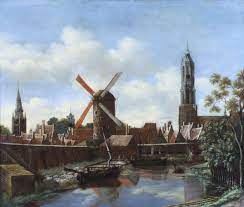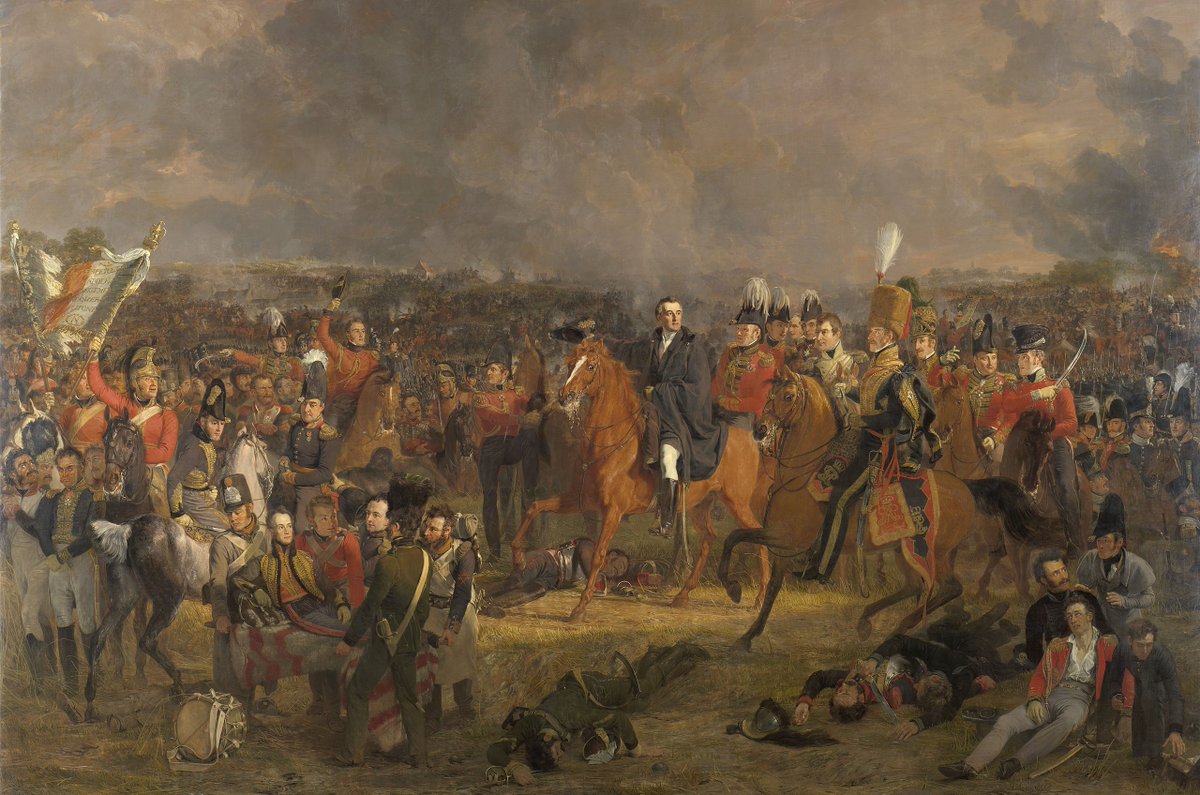
Britain's pre-WWI industrial supersession by America and Germany was inevitable: a (long) thread: ⬇️ 1/
The Great Exhibition of 1851 is commonly regarded as the zenith of early British industrialization, with the great Crystal Palace displaying the wonders of British technology before the visiting public. 2/ 

The next twenty years also saw the fastest GDP per capita growth in British history, rising to 2.06 percent until 1873. Exports (two-thirds of which were manufactured goods) tripled. 3/
Then, the climacteric: productivity growth fell to 1.18% until 1899 and then to .85% to 1914. Manufactured exports stagnated until 1900. Pessimism, fear, and declinism stalked the serious press. 4/
Across both the Channel and the Atlantic, America and Germany both seemed to be rising inexorably. US manufacturing was 50% more productive than British in 1870 and twice as high in 1914. Germany converted a 15% deficit into a 20 percent lead over the same period. 5/ 

Britain's time as workshop to the world was over. Her intellectuals inspired an entire literature in economic history casting about for someone or something to blame. 6/
Many, from Alfred Marshall to David Landes, have blamed British entrepreneurs for their inherent conservatism. They ignored best-practice technologies and were insufficiently aggressive in foreign markets, preferring the practical knowledge and old industries to modernization. 7/ 

But this was false. As @timleunig has shown, managers rationally adopted new technologies, persisting with mule-spinning over ring-spinning because they had access to cheap skilled labor. Lancashire mule-spinners were 10% more productive than New England ring-spinners. 8/ 

British managers and entrepreneurs were clearly no more stupid than their international counterparts. But what about British savers? From 1870 to 1914, one-third of annual UK investment went overseas. 9/
This capital could have been used to build plants, modernize machinery, and improve infrastructure. Instead, it went into the construction of North American railroads, telegraph lines, and power grids. The regions outstripping British growth did so with British capital. 10/
Economic historians allege that British savers were biased toward overseas investment, ignoring good opportunities at home and purchasing foreign bonds. They did so, the story goes, because UK financial institutions were badly suited for industrial promotion. 11/
But the evidence for this is scant. While British banks did specialize in trade, the effects on the economy were exaggerated. Relationship banking on the Continental model in any event frequently led to over-close ties between industry and finance, and rafts of crises. 12/
Moreover, Britons were right to invest abroad—rates of return in America were simply higher than at home, even adjusted for the supposed risks inherent in private and public foreign securities. 13/ 

Historians ritually denigrate Britain's education system, suggesting that a combination of insufficient support for primary and secondary education with an elitist, humanities-centered university system left the workforce untrained and inadequately supplied with scientists. 14/ 

But both claims are demonstrably false. Britain's apprenticeship system, for one, allowed employers to educate workers in crucial on-the-job skills through learning-by-doing, and the state financed technical education in evening classes. 15/
The number of engineers dramatically increased. The Institution of Mechanical Engineers grew from nothing to 7,000 members and the number of engineering firms rose from a few hundred to 3,700 in 1892. 16/ 

Postsecondary scientific education expanded quickly over the same period, and the evening classes were admired by American observers (who had no equivalent). British workers were actually more skilled than their American counterparts and were sought by foreign firms. 17/ 

While the Americans did have a substantial lead in primary education, and started to expand secondary schooling after 1900, Britain was closing the gap over 1870-1914, exactly as she was falling behind in productivity terms. The gap to Germany was completely closed. 18/ 

Moreover, it's not clear that formal schooling was particularly important to the economic tasks available to workers in the nineteenth century industrial economy. Services, which were more strongly impacted by secondary education, only started to expand in the 20th century. 19/
So why was Britain falling behind? I suggest that the answer is obvious: competing with America, and to a lesser extent Germany, was impossible. 20/
The breakthrough technological and organizational advances of the early Second Industrial Revolution revolved around the the Chandlerian firm: vertically and horizontally integrated, high-throughput mass production. 21/ 



Mass production suited America's unique factor endowments. She had abundant fuel and raw materials—the world leader in natural gas, petroleum, coal, iron ore, and copper output—but was labor-scarce relative to the Old World, especially in skilled workers. 22/ 



As Gavin Wright (1990) has argued, US production became fuel- and resource-intensive. Steel output exploded, thanks to cheap coal. Fixed capital and machinery substituted for skilled labor in industry; in 1907-9 US firms used 2x UK horsepower for the same productivity. 23/ 

Railroads and canals gave US producers access to more resources and integrated the mass market. Firms could use longer production runs, enlarge their facilities, and exploit economies of scale in a way impossible in Britain. Ford UK paid 50% more than Ford US for steel. 24/
Oil refineries, for example, went from producing 900 barrels a week to 1000 a day during the 1870s alone, halving unit costs, even though the capital costs of plant tripled. Velocity *and* size combined to make the US an exporter of steel, machinery, and petroleum by 1914. 25/ 

These conditions were well-suited to the United States, but not Britain, whose population was less than half that of the US in 1914. Britain could expand her market by exporting, but the late 19th c. saw her rivals raise protectionist tariffs. Exports stagnated after 1873. 26/ 

Mass production was inapplicable with Britain's cost structure: cheaper labor and dearer inputs. The British stuck to skill-intensive sectors with "flexible production" of custom outputs; industries where British workers honed skills, like iron shipbuilding, stayed British. 27/ 

Capital exports and education differences were caused by America's industrial rise. Rates of return on US projects, say railroads to ore and coal deposits, were just higher than on British equivalents. Transport, power, and telegraph systems would have far more users. 28/
As Taylor and Williamson (1994) have argued, Britain's relatively older society had excess savings relative to young immigrant America; foreign investment was thus an intergenerational transfer to young borrowers. They attribute 2/3 of UK capital flows to this cause. 29/ 

America's educational advantages at the primary level were actually irrelevant to her industrial success. Mass-production was low-skill, and was often performed by foreigners, who comprised 60 percent of machine operatives circa 1910. 30/ 

Goldin's "human capital century" was the 20th, not the 19th; though high schoolers did start to enter industry after 1900, they lacked the intermediate-level skills of their British counterparts. Formal education gained increasing relevance only with the rise of services. 31/
Critics blame Britain's artisan shopfloor control for inhibiting technological/organizational advances on US lines, but this was endogenous. As @pseudoerasmus notes, America started with a similar system, which was broken by immigrant labor—who came seeking high US wages. 32/ 

British managers, capitalists, and educators were neither stupid nor conservative. The technological and organizational advances that bridged the gap between the 1st and 2nd Industrial Revolutions were unaffordable; the optimal techniques were older with less room for growth. 33/
The giant customs union of the United States, and the smaller one of Germany, unified national markets that island Britain couldn't match, and her exports were increasingly barred from European and New World markets by rising tariffs by the end of the 19th century. 34/ 

Britain didn't fail. She played the "leading role" in Edwardian high finance and dominated shipping. But the frontier growth path of Chandlerian mass production was blocked by scale and resource constraints, leaving Britain powerless to stop the inexorable rise of America. 35/
Tagging some of the economic history crowd before I forget: @joefrancis505 @VincentGeloso @MarkKoyama @adam_tooze @DuncanWeldon @arielronid @judyzara @pseudoerasmus @kevinhorourke @gabriel_mathy @BAllanHansen @delong @antonhowes
I'd be remiss if I didn't mention that this is a synthesis of some ideas that I've been working through in recent blogposts. See here, on the Victorian growth slowdown: daviskedrosky.substack.com/p/improvident-…
Here, on foreign investment: daviskedrosky.substack.com/p/the-effluent…
And here, on education: daviskedrosky.substack.com/p/the-educatio…
• • •
Missing some Tweet in this thread? You can try to
force a refresh















